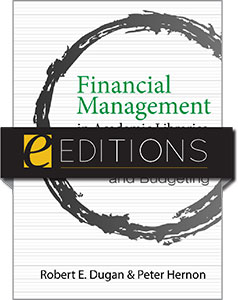
Financial Management in Academic Libraries: Data-Driven Planning and Budgeting—eEditions PDF e-book
The download link for this product can be found on the final confirmation screen after you complete your purchase, and may also be accessed from your Account Profile. For more information about ALA eEditions file types and how to view them on eReaders, desktop computers, and other devices, see this page.
Primary tabs
You don't need to be an ALA Member to purchase from the ALA Store, but you'll be asked to create an online account/profile during checkout to proceed. This Web Account is for both Members and non-Members. Note that your ALA Member discount will be applied at the final step of the checkout process.
If you are Tax-Exempt, please verify that your account is currently set up as exempt before placing your order, as our new fulfillment center will need current documentation. Learn how to verify here.
- Description
- Table of Contents
- About the authors
An academic library’s budget and expenditures demonstrate its accountability, effectiveness, efficiency, and sustainability to its institution. All library managers must understand and manage budgets, from planning through implementation, reporting, and conducting audits. Budgeters also need familiarity with the use of metrics, the ability to relate the use of the data gathered to improved performance and organizational efficiency, and automated management information systems to effectively tell their library’s story and advocate for budgetary support.
In its first eight chapters, with tables, figures, data application, and exercises throughout, Financial Management in Academic Libraries: Data-Driven Planning and Budgeting covers the various stages and topics involved in managing budgets: planning; the types of budgets used in academic institutions; the overall budgeting process as well as a specific process in program budgeting; managing a budget during the fiscal year and its aftermath; and providing reports on the budget. The ninth chapter introduces general concepts to help address budget reduction strategies, potential fraud, and financial best practices. And the final chapter elevates the discussion from financial management to financial leadership, the articulation of a detailed vision, and the realignment of the budget with the promises specified in that vision.
Financial Management in Academic Libraries explores the connection between financial management and accountability, effectiveness, efficiency, and sustainability, and demonstrates how to capture them in a realistic, data-supported budget. Among the different units of an academic institution, the library has an advantage in that its managers can link these concepts to the library’s infrastructure, its staffing, collections, services, and technology. Focusing on these components can enable everyone in the library to work to achieve organizational sustainability over time and advocate for their place in the institution.
Preface
Chapter 1. Planning
Chapter 2. General Concepts: Just So We Are on the Same Page
Chapter 3. Types of Budgets
Chapter 4. Budgeting
Chapter 5. Program Budgeting
Chapter 6. Managing a Budget during the Fiscal Year
Chapter 7. Reports and Reporting
Chapter 8. Uses of Expenditures Data
Chapter 9. A Smorgasbord: Budget Reduction Strategies, Fraud, and Best Practices
Chapter 10. Financial Leadership
Appendix. Answers to Exercise Questions
About the Authors
Robert E. Dugan
Robert E. Dugan is director of the Mildred F. Sawyer Library at Suffolk University in Boston. He has worked in libraries for more than 27 years serving as associate university librarian, state librarian, public library director, and reference librarian. Dugan is the author of more than 40 articles on information policy and the use of technology and has coauthored two books, including U.S. Government on the Web.
Peter Hernon
Peter Hernon is a professor emeritus at Simmons College, Boston, and was the principal (and founding) faculty member for the doctoral program, Managerial Leadership in the Information Professions. He received his PhD degree from Indiana University, Bloomington, and was the 2008 recipient of the Association of College and Research Libraries' award for Academic/Research Librarian of the Year, the founding editor of Government Information Quarterly, and past editor-in- chief of The Journal of Academic Librarianship. He is the coeditor of Library & Information Science Research and has taught, conducted workshops, and delivered addresses in eleven countries outside the United States. He is the author or co-author of 57 books, including the award-winning Federal Information Policies in the 1980s (1985) and Viewing Library Metrics from Different Perspectives (2009).
Association of College and Research Libraries (ACRL)
Association of College & Research Libraries (ACRL) is the higher education association for librarians. Representing more than 11,000 academic and research librarians and interested individuals, ACRL develops programs, products and services to help academic and research librarians learn, innovate and lead within the academic community. Founded in 1940, ACRL is committed to advancing learning and transforming scholarship.


